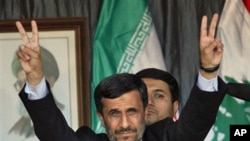Iranian President Mahmoud Ahmadinejad's rousing welcome to Lebanon underscores how larges sums of Iranian money have boosted Tehran's influence in the Lebanese political arena.
Tens of thousands of Lebanese have been pouring out to welcome Iranian President Mahmoud Ahmadinejad to their country, with an especially heavy turnout in Beirut's southern suburbs and parts of southern Lebanon controlled by the pro-Iranian Hezbollah.
Hezbollah's leader, Sheikh Hassan Nasrallah, urged his supporters to turn out for Mr. Ahmadinejad in a speech last weekend. He indicated that Lebanese "should be thankful to Iran for rebuilding their country," after the devastating summer war with Israel in 2006.
Many analysts contend that Hezbollah would not exist were it not for Iranian funding, and Tehran's political influence has swelled in recent years along with its financial support.
Hezbollah was founded by Iran in 1982, with the financial backing of Iran and support of Syria, to combat Israel's invasion of Lebanon. The group later mounted a rear-guard campaign against the multi-national force that deployed after Israel withdrew.
Former Iranian President Abolhassan Bani Sadr estimates that Tehran has been spending, at the very least, around $300 million per year on its allies in Lebanon, including Hezbollah.
He says that according to figures he's seen, Iran has given around $1 billion for the reconstruction of southern Lebanon over the past four years, for an annual figure of $250 million, which, when added to expenses to run Hezbollah, as well as weapons, raises the figure to $300 million per year. He stresses that $300 million is a conservative estimate, given the heavy cost of re-arming Hezbollah after the 2006 war against Israel.
Bani Sadr contends Iran's military has also benefitted by pocketing billions of dollars in the process.
The Beirut press, in recent years, has also accused Tehran of throwing tens of millions of dollars at Lebanese political figures who are allied to Hezbollah and Syria.
Middle East expert James Denselow of King's College in London notes that the weakness of the Lebanese state makes it both easy and attractive to outsiders like Iran to give money to its politicians. And, he thinks that Iran may be on the verge of changing that strategy and helping the Lebanese government, as well.
"It's a very easy thing to do, because the state is so weak and the sub-state groups are far stronger," said Denselow. "It's just a case of patronizing these groups. But, what I think is very interesting about this trip, is whether Iran is looking to up its gains and look to appeal to Lebanon as a country, and in particular looking at energy deals and procuring gas and oil supplies to Lebanon, which has huge problems with its power supply."
Denselow points out that Iran has used the same tactic in strengthening its alliance with Syria and that energy deals signed with Lebanon Tuesday reveal a similar strategy. A long-term Iranian relationship with the Lebanese state, he argues, is something that "the U.S. will have to struggle to compete with."
As for Iran's military relationship with Hezbollah, Denselow argues that the secrecy of its arms shipments is meant to keep Israel off guard.
"In terms of weapons, a lot of it is actually constructive ambiguity on the part of Hezbollah," he said. "That gives it a sort of strategic sense of surprise. In 2006, the use of Silk Worm anti-ship missiles was the sort of sign to Israel that it was actually more capable than Israel intelligence suggested, as well as the very effective use of good anti-tank weapons."
"So, there are estimates that some 30,000 rockets have been resupplied to Hezbollah, and there have been estimates about whether these are injected-fuel rockets that require time to prepare, but otherwise they are well-hidden and very secretive in nature," he added.
Iran has reportedly offered to supply weapons to Lebanon's national army. The subject arose last August, after the U.S. Congress blocked funding for Lebanon's military, following an attack on Israeli soldiers along the border.




